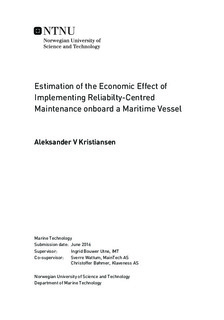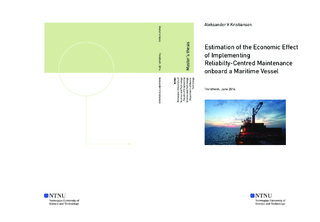| dc.description.abstract | This master s thesis presents estimations of the economic effect of implementing reliability-centred maintenance (RCM) onboard a maritime vessel in order to help shipping operators with maintenance strategy decision making.
The recent halt in the global economic growth, combined with an increase in the ship supply capacity, has led to challenging conditions for ship-owners competing in the container freight market. As their revenues decline, they need to find new areas where they can save costs in order to stay competitive. A new approach to maintenance management may help achieve such cost savings. The results of this thesis show that the maintenance related life-cycle costs of certain shipboard systems may be reduced by up to 75 % by implementing RCM. The savings seem to be increasing with the criticality of the system.
Most ship-owners are currently following the recommendations from their equipment suppliers when they plan the onboard maintenance. These suggestions do normally not consider the equipment s operating context, and often call for system overhaul with pre-defined intervals. This approach is considered to belong in the second of the three generations of maintenance. It is believed that any organisation can achieve several benefits by advancing to the third generation, including cost savings, better safety records and more satisfied employees. RCM is considered an effective tool to help the organisation take this step.
The abovementioned benefits are mainly based on qualitative statements, however, so this thesis presents a method for providing quantified values, as well as using the method in a case study. First, two shipboard systems, the anti-heeling system (AHS) and the starting air system (SAS), are analysed using the RCM process, to develop alternative maintenance schedules. The behaviour of these schedules, as well as the currently used maintenance plans, are then evaluated by use of Monte Carlo simulation (MCS). Finally, the performances of the different plans are compared against each other, with regard to life-cycle costs and the occurrence of failures.
The resulting maintenance schedules show that the RCM plans call for approximately the same amount of planned maintenance activities, but they shift the focus from calendar based overhauls to condition based interventions. Allowing more condition controls causes a reduction in the number of complete system failures and an increase in the amount of deteriorated performances identified.
Reducing the severity of the failures also affects the maintenance related life-cycle costs. The RCM based schedule for the anti-heeling system achieves savings of 22 % related to the current plan. The more complex starting air system gains even larger cuts, reducing the life-cycle costs with around 75 %. Sensitivity analyses indicate that the RCM schedules may bring additional savings when the economic consequences of a failure get more severe. The economic effect of implementing RCM on safety or environmentally critical systems is still unclear. | |

